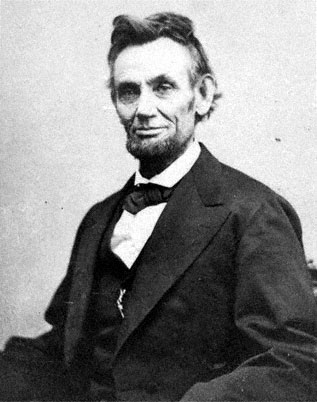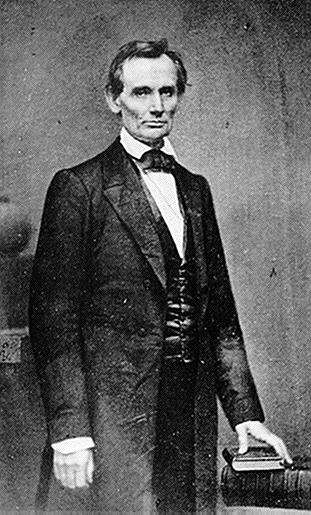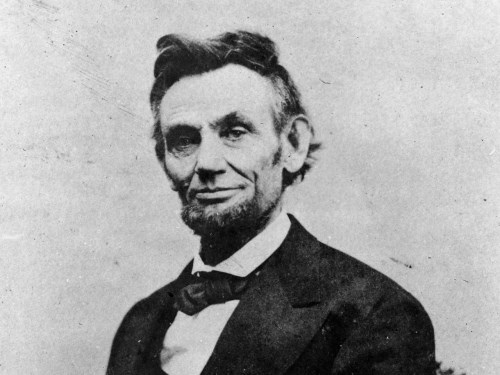 |
| A picture of Lincoln. ( ()) |
Life can be tough for one born in poverty; however, the impoverished can still rise up and achieve many great things during one's lifetime as did Lincoln. Few individuals exemplified this as much as Lincoln, who rose up from poverty to become our 16th president. Lincoln was born in a log cabin on February 12, 1809, in Hardin County, Kentucky. In 1832, Lincoln became a captain in the Black Hawk War; later he was elected as a state legislature for eight years after the war. Lincoln married Mary Todd on November 4, 1842, and he had four children. Lincoln became the sixteenth President of the United States on March 4, 1861. Some of his greatest achievements were that he rallied the Union together and freed the slaves during the Civil War. Unfortunately his life was cut short due to assassination on April 15, 1865, by John Wilkes Booth. Abraham Lincoln's life unveils his heroic traits. Abraham Lincoln is a hero not only because of his determination and humanitarianism, but also because he was merciful to the rebels when the war was coming to an end.
 |
| Apicture of Lincoln when he was young. ( ()) |
Abraham Lincoln's determination throughout his life
is his most important heroic trait. This is because Abraham Lincoln could not
be a hero without his raw determination. The following quote supports this idea. "In 1858, Lincoln made
a second bid for the United States Senate. As the Republican nominee, he faced
a grueling race against the Democratic incumbent senator, Stephen A. Douglas,
and challenged the champion of popular sovereignty to a series of debates.
Never one to back down from such a contest, the senator agreed to meet Lincoln
for seven debates, spread geographically across the state and taking place from
August 21 to October 15. Their fiery exchanges drew large audiences and
national press coverage." (Lincoln, Abraham)
 |
| Another picture of Lincoln. ( ()) |
Abraham Lincoln's humanitarianism is also one of his most important heroic traits. Lincoln chose to promote freedom instead of not taking action and letting slavery spread throughout the U.S. His humanitarianism was demonstrated in this quote: "Lincoln lobbied hard in December and January for the Thirteenth Amendment which would ban slavery throughout the U.S. and was delighted with its passage on January 31, 1865." (Abraham, Lincoln) It is clear that Lincoln promoted freedom because he created the 13th Amendment to make slavery illegal in the U.S. In addition, Lincoln promotes freedom as the quote says that he was delighted that the 13th Amendment was passed in the U.S. Lincoln's promoting of freedom started when he was young, as indicated in this quote: "Abraham in turn resented the requirement of law and custom that any wages he earned before he came of age by hiring out to neighbors to split rails, for example must be given to his father. One historian has suggested that Abraham Lincoln's hatred of chattel slavery, which denied to slaves the "fruits of their labor," may have originated in Thomas Lincoln's expropriation of the teenage Abraham's earnings." (McPherson, James M.) Lincoln's childhood experience of performing manual labor without earning allowed him to experience firsthand a condition similar to that of slavery. Even though Lincoln performed hard labor, every cent earned was paid to his father. This denial of the "fruits of his labor" formed the basis for his argument that slavery was inhumane, therefore must be abolished. Lincoln is a hero, owning to his efforts to free slaves.
Abraham Lincoln's forgiveness to the rebels is one
of his most crucial heroic traits. Lincoln chose to be merciful to the rebels
instead of being harsh to them. This is reflected in this quote: "With malice
toward none; with charity for all; with firmness in the right, as God gives us
to see the right, let us strive on to finish the work we are in; to bind up the
nation's wounds...." (Abraham Lincoln) Lincoln stated that he had no malice nor
hate to the rebels so he was forgiving to the Confederates. Lincoln's forgiveness
was clearly shown in his speech that there should be charity to all people, even
including the rebels. In addition, Lincoln revealed his forgiveness in his plan
for the reconstruction according to this quote: "On December 8th, 1863 he issued a 'Proclamation
of Amnesty and Reconstruction,' offering pardons to most categories of
Confederates who would take an oath of allegiance to the United States. When
the number of those pardoned in any state equaled 10 percent of the number of
voters in 1860, Lincoln authorized them to form a Union state government, to
which he promised executive recognition." (McPherson, James M.) Lincoln's plans
did not punish the rebels for fighting the Union. The plan did not put the
Confederates under martial law when they rejoined the Union. Now it is clear
that Lincoln's mercy to the rebels is one of his crucial heroic traits.
Abraham Lincoln is a hero because of his determination, humanitarianism, and forgiveness. Abraham Lincoln shows us that we could do great things even if we were born in poverty. Lincoln inspires me with his determination to achieve his goals and his painstaking efforts to abolish slavery in the U.S. He also inspires me because he was merciful to the rebels with a very lenient plan, despite many proposals others had to punish rebels. Abraham Lincoln is an iconic example of a true hero, as his determination, humanitarianism, and mercy changed the course of the nation's future for the better in a time of great civil strife. "Abraham Lincoln." The White House. Web. 14 Dec. 2011. McPherson, James M. "Abraham Lincoln." American National Biography (2010): 1. Biography Reference Center. Web. 7 Dec. 2011.
Page created on 1/16/2012 12:00:00 AM
Last edited 1/16/2012 12:00:00 AM
